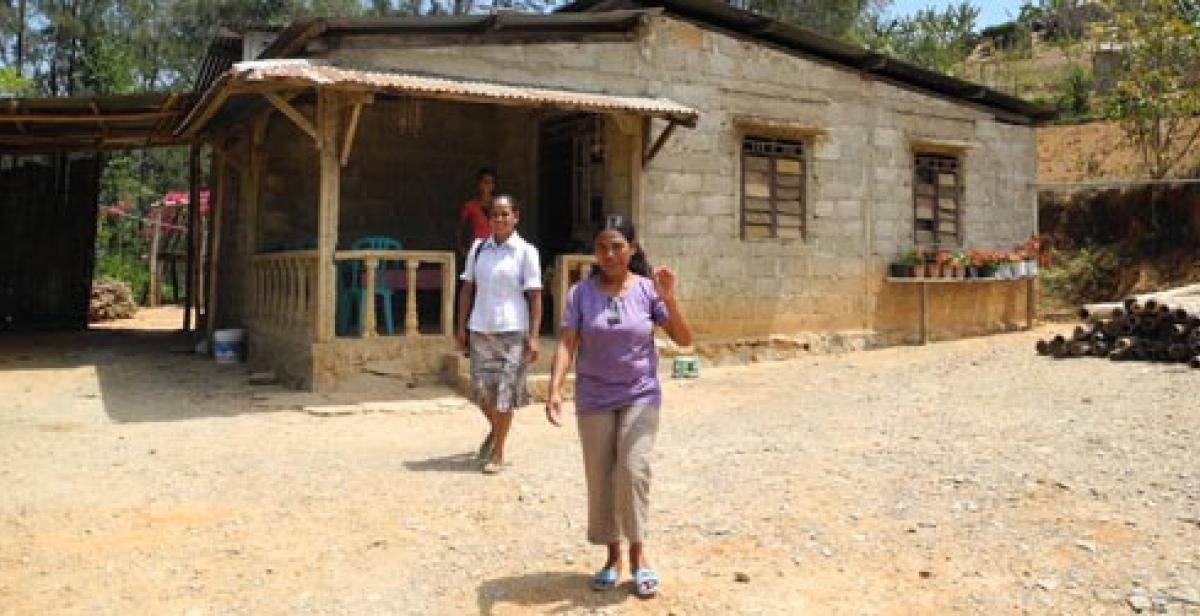When I meet Yasinta Lujina, the director of the women's network Rede Feto, she has just had a meeting trying to secure more funding for the 4th Women's Congress (due to be happening in December). "It's a massive logistical operation," Yasinta tells me. "There were 500 women at the last one and we provide transport and accommodation here in Dili for all of them."
Having travelled around the districts bordering Timor-Leste's capital city, I can tell you this is no mean feat. There are no trains and the roads - where there are any - are in desperate need of attention: the joke here is that they aren't roads just 'joined up pot holes'.
Meeting and sharing
The Women's Congress is held every four years in the capital, Dili. It brings together the 24 member organisations of Rede Feto, which means ‘women's network’, and the women they work with. The aim of the Congress, Yasinta says, is to "bring women from different areas together and give them the chance to share experiences and discuss important issues facing women in Timor Leste today."
Whilst you cannot escape wi-fi in Dili, 40% of the country still doesn't have electricity which can make disseminating information very difficult. The Congress therefore offers many women a unique opportunity to learn about and debate solutions to the inequality most of them currently face.
Meaningful outcomes
But the Congress isn't just a big mothers meeting. There have been some very meaningful outcomes over the past 16 years. Most notably these include a booklet detailing all the recommendations decided on at the Congress regarding the seven commissions of Timorese central government with respect to their impact on women; and arranging for a representative from one of the Rede Feto members to sit in each commission. Yasinta is very pleased about the latter:
"It means we can give direct feedback and make sure our recommendations are heard and considered at the highest level," she says. "We have worked very hard for government to take us seriously both personally as women and professionally as the network."
Getting involved
Yasinta, 34, joined Rede Feto in 2009. "I just wanted to get involved!" she says. "I never thought I would end up being the director," Yasinata smiles wryly, "but I am very passionate about women's rights and our fight for equality."
She is very positive about the network's well-established relationship with Progressio. Yasinta credits the Progressio development workers who have worked with Rede Feto with improving the network's communications between members, improved internal evaluations and strategic planning based on those evaluations.
A long way to go
For all her enthusiasm and can-do attitude Yasinta is open about the challenges women and the network face in Timor-Leste. "Our patriarchal society is the biggest problem. Men run all industries and always have the final say - whether in business or in the home."
This is not something that will change over night but 10 years on from independence Yasinta hoped gender equality would have come further than it has. When I ask her if women's equality has come a long way since her childhood she hesitates, then shakes her head: "Not a long way, but yes a little way. Definitely a little way. There have been important steps but only small ones. We still have a long way to go."
What is still needed?
Some of these important steps include the introduction of some significant legislation such as a law prohibiting domestic violence and another requiring one third of MPs are female. With regards to the former Yasinta says, "We need to socialise the law through education and helping women bring their cases to court. The network's job is to help facilitate this, not to resolve individual disputes." There has been a generally positive response at many levels to the domestic violence law, with local government developing a good relationship with the police and hospitals, but there remain whole districts where no men have been convicted despite many trials.
"The legal and judicial system needs strengthening," Yasinta says decisively. "All leaders need to show their real commitment to women's issues. I would like them to lead by example." This is hardly the case at present as the Minister of Health is widely known to have been prosecuted in the past for beating his wife and on several other counts of sexual harassment.
A new generation
"The new aim," Yasinta tells me, "now women have their independence, is to liberate them. A new generation is coming through." Although she is not particularly positive about the overall progress made toward gender equality, she does acknowledge some good changes within her own family.
"My husband is now very understanding of women's issues," Yasinta says smiling, clearly very proud and pleased about this.
"He respects the fact I work and will help with childcare and housework if I am busy with work. He will even prepare food sometimes. We teach our children that men and women can do the same things but sometimes this contradicts what they learn at school."
Hope for the future
Her children and their friends is where Yasinta places her hope for the future of women in Timor-Leste. "I don't know how much things will change in my life time, but I hope the work I've done will make a difference for the next generation and the ones after. I hope my children can be an example to others."
Yasinta comes across as incredibly strong but with a heart of gold. She genuinely cares about her work and is not prepared to see the network fail in its pursuit of true gender equality. If she, and those she works with, persist with the same amount of pure grit and determination as they currently have, I can't help but think they will succeed in making life better for women all over Timor-Leste.
Lucy Jenkinson is Progressio’s media officer. She visited Timor-Leste in September 2012.
Photo: Women in Estada village, Timor-Leste (photo by Lucy Jenkinson)



